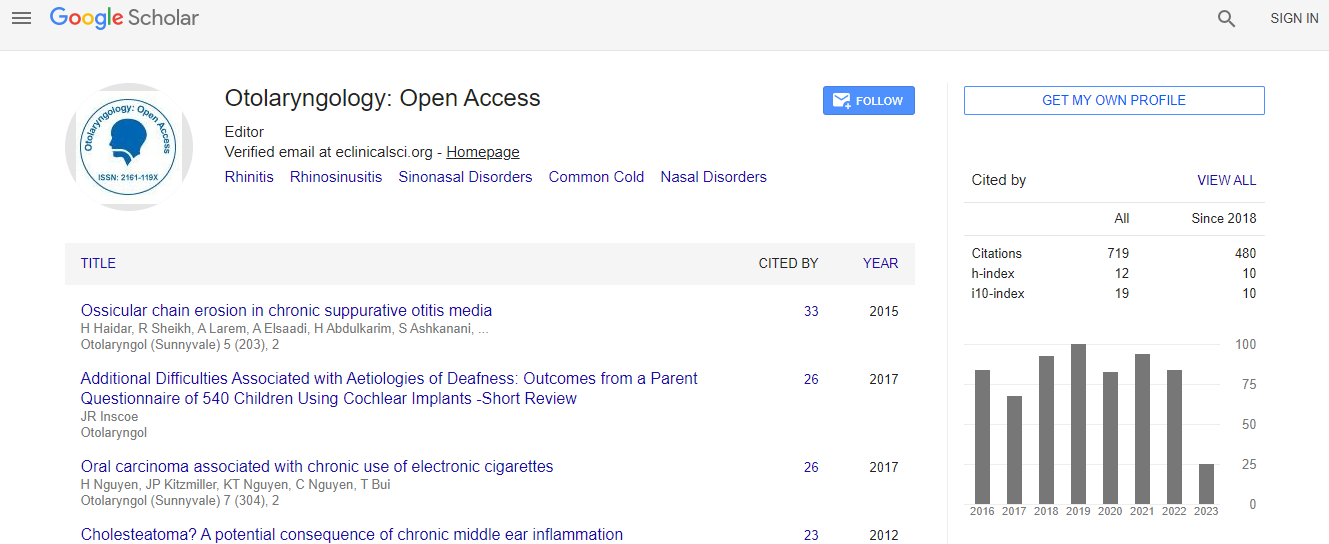Our Group organises 3000+ Global Events every year across USA, Europe & Asia with support from 1000 more scientific Societies and Publishes 700+ ║┌┴¤═° Journals which contains over 50000 eminent personalities, reputed scientists as editorial board members.
║┌┴¤═° Journals gaining more Readers and Citations
700 Journals and 15,000,000 Readers Each Journal is getting 25,000+ Readers
Citations : 925
Indexed In
- Index Copernicus
- Google Scholar
- Sherpa Romeo
- Open J Gate
- Genamics JournalSeek
- RefSeek
- Hamdard University
- EBSCO A-Z
- OCLC- WorldCat
- Publons
- Geneva Foundation for Medical Education and Research
- ICMJE
Useful Links
Recommended Journals
Related Subjects
Share This Page
SpeechEasy device on stuttering treatment: A randomized clinical trial
3rd International Conference and Exhibition on Rhinology & Otology
Claudia Regina Furquim de Andrade
University of Sao Paulo, Brazil
ScientificTracks Abstracts: Otolaryngology
DOI:
Abstract
SpeechEasy is an electronic device used to treat stuttering, similar in appearance to a hearing aid. However, rather than amplifying sound, SpeechEasy device alters the way its users perceive their own speech, so that they hear their voice at a slight time delay and at a different pitch. This effect is called altered auditory feedback (AAF), i.e., the use of a digital signal processor to produce a second altered signal using one├ó┬?┬?s own speech. The alteration to the auditory feedback creates the illusion of a second speaker producing similar linguistic material, emulating choral speech. Previous studies, besides their largely different purposes and methodology, appear to agree that AAF can decrease the number of stuttering events without changing naturalness characteristics of speech production. However, substantial variability is found across studies regarding degree and pattern of benefit. The present study is a randomized clinical trial, undertaken to verify the effectiveness of SpeechEasy device on stuttering treatment in comparison to behavioral techniques. Two groups participated: Group 1 consisted of 11 people who stutter including 10 males and 1 female aged 21-42 years (M=30.0). Group 2 consisted of seven people who stutter including six males and one female, aged 20-50 years (M=35.6). Participants in Group 1 were fit with a SpeechEasy and were not given any additional training (i.e., supplementary fluency enhancing techniques). Participants used the device daily for six months. Participants in Group 2 received treatment in the form of a 12-week fluency promotion protocol with techniques based on both fluency shaping and stuttering modification. There were no statistically significant differences (p>0.05) between groups in participants├ó┬?┬? stuttered syllables following treatment. That is both therapeutic protocols achieved approximately 40% reduction in number of stuttered syllables with no significant relapse after three or six months post-treatment. The results suggest that the SpeechEasy device can be a viable option for the treatment of stuttering.Biography
Claudia Regina Furquim de Andrade is a Speech, Language and Hearing Therapist. She has completed her under graduation course at the Catholic University of São Paulo, Brazil in 1979. She has earned a PhD in Linguistics from the University of São Paulo (1994). She is a Full Professor at the School of Medicine, University of São Paulo, Brazil, since 2001. She has published 127 papers in indexed journals and 285 abstracts in conference proceedings. She has published 48 book chapters and 22 books and received 46 awards. She is the Director of Speech-Language and Hearing Science.
Email: clauan@usp.br

